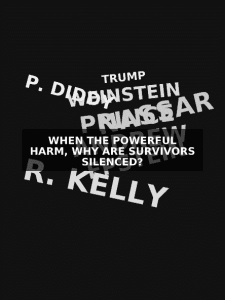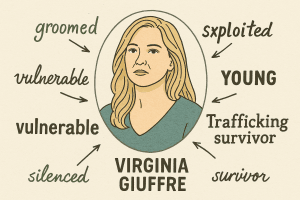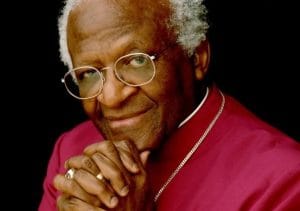Desmond Tutu Taught Us: Healing Begins with Recognition, Not Excuses
Archbishop Desmond Tutu taught the world that true healing begins not with technicalities or excuses, but with recognition of harm and truth-telling.
In the Epstein and in many abuse stories, people ignored that crucial step.

Survivors Denied Agency from the Start
They negotiated the 2007–2008 non-prosecution agreement (NPA) in secret. The authorities never informed the survivors, even though they had a legal right to take part.
A federal court later admitted this violated their rights — but by then, the damage was done.
The message was simple: survivor voices did not matter. When someone enforces silence, healing cannot begin.
The Double Trauma of Abuse and Stigma
For many, the abuse was only the beginning. They faced disbelief, stigma, and smear campaigns: “liars,” “gold-diggers,” “in it for the money.”
This second trauma — of being discredited and silenced — leaves deep emotional scars. Survivors need belief, validation, and support for true trauma recovery.
Justice should serve healing — yet it often becomes another site of harm.
The Personal Cost: Virginia Giuffre

Even when survivors receive settlements, the personal cost can be unbearable. Virginia Giuffre’s story illustrates the long journey from survival to healing.
Though she reached a reported £12 million settlement with Prince Andrew, the stigma that she had “lied for money” never faded.
No payout can erase the psychological wounds, the endless cross-examination of credibility, or the isolation of being doubted.
Her tragic death reminds us that financial settlements are not justice — healing requires truth, not transaction.
Survivors Built the Case Against Maxwell
The survivors’ absence would have prevented Ghislaine Maxwell’s conviction. Their resilience and courage made the case possible.
And yet, even after the verdict, public debate circled around plea deals and celebrity names — sidelining the women whose testimonies changed history.
Survivor journeys are the backbone of justice, but recognition of that truth remains elusive.
More than a thousand survivors
The Epstein Victims’ Compensation Program paid out over $125 million to 135 survivors.
Yet, Epstein and his associates harmed over 1,000 girls and women, according to investigative reports.
This scale of abuse is staggering — and it demands more than legal analysis. It calls for a collective moral reckoning, and for a global commitment to healing through acknowledgment.
The Politics of Distraction
Even reporting revealed bias. While Sarah Ferguson’s public shaming for accepting Epstein’s money was troubling, it distracted from the men who abused children.
Once again, women next to power were punished, while the powerful men remained untouched. The survivors remained invisible.
Survivors Silenced, Careers Lost
The imbalance of power is not unique to Epstein.
Weinstein’s victims — including Ashley Judd and Mira Sorvino — lost careers for daring to speak. Sean “Puff Daddy” Combs made Cassie’s abuse seem like a love story.
People dismissed R. Kelly’s victims for years, hiding behind “culture.”

Each case reveals the same pattern: power protects predators; stigma punishes survivors.
Yet these women persisted — reclaiming their stories, rebuilding their lives, and showing that resilience is an act of resistance.
Beyond Prosecutions: Recognition and Healing
Legal processes alone cannot deliver justice. Settlements often silence. Convictions are rare.
What’s missing is recognition — the acknowledgment of harm, the validation of pain, and the honouring of those who survived.

Archbishop Desmond Tutu’s Truth and Reconciliation Commission in South Africa offered a profound lesson: healing begins with truth-telling.
It offered a model of justice that centres on survivors, invites empathy, and transforms suffering into collective responsibility.
Survivors of Epstein — and all survivors of abuse — deserve nothing less.
Every prosecution will stay incomplete and every legal victory hollow until someone hears, believes, and honours them.
Moving Toward Collective Healing
Recognition is the first step, but healing is a journey.
It requires spaces where survivors can reclaim their voices, communities that prioritise empathy over reputation, and systems that replace secrecy with transparency.
As Desmond Tutu reminded us:
“True reconciliation exposes the awfulness, the abuse, the pain, the truth. It could even sometimes make things worse. But in the end, it brings forgiveness, liberation, and peace.”
Healing begins when people speak the truth and truly listen.
Why These Principles Still Matter?
The principles Desmond Tutu supported — truth-telling, acknowledgment, and reconciliation — are not only for nations emerging from political violence. They are equally vital for survivors of sexual abuse and assault, whose pain is often silenced, denied, or dismissed. These wounds don’t end with the individual — they ripple across families, communities, and generations.
Imagine a Truth and Reconciliation process for survivors of sexual violence, which would invite them to speak without fear, listen without judgment, and provide recognition. A process rooted in truth, empathy, and accountability, not secrecy or shame.
For the survivors of Jeffrey Epstein alone — more than a thousand women and girls, though the true number is likely far higher — such a process could transform despair into healing and intergenerational repair. It would not erase the past, but it could finally offer them what they have long missed: public acknowledgment of the wrongs they suffered.
Desmond Tutu understood wounds left in the dark fester, but when people speak the truth, healing can begin. His philosophy never confined itself to politics, focusing on restoring humanity wherever someone stripped it away.
The Legacy of Archbishop Desmond Tutu
Archbishop Desmond Mpilo Tutu (1931–2021) was a South African Anglican cleric, theologian, and human rights activist who became a global symbol of moral courage and compassion. During the darkest years of apartheid, he used his voice and his faith to condemn racial injustice and call for nonviolent resistance. In 1984, he received the Nobel Peace Prize for his tireless advocacy.
After apartheid ended, he led South Africa’s Truth and Reconciliation Commission, a unique process that invited victims and offenders to speak publicly. Its philosophy was revolutionary: there is no future without forgiveness. Rather than seek vengeance, Tutu sought to heal a nation through truth-telling, recognition, and restorative justice.
He believed that healing requires confronting pain, not hiding it — and that the act of listening, of bearing witness, could transform both victim and perpetrator. His work inspired similar truth commissions in Rwanda, Sierra Leone, and Canada, and continues to guide movements for justice today.
In a world still grappling with abuse, inequality, and silence, Archbishop Tutu’s message endures, there can be no peace without justice, and no justice without truth. Recognition is not a formality; it is the first act of healing.
As Tutu reminded us:
“True reconciliation exposes the awfulness, the abuse, the pain, the truth. It could even sometimes make things worse. But in the end, it brings forgiveness, liberation, and peace.”
His life — and his faith in humanity — remind us that every truth told is a step toward collective healing.